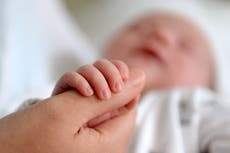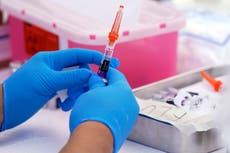What is RSV and why does it affect babies so badly?
Respiratory condition that can lead to pneumonia and bronchiolitis in infants and the elderly threatens at a time when influenza and Covid also prevalent

Experts are warning Britons to be on the lookout for respiratory syncytial virus (RSV) this winter, a contagious disease related to mumps and measles that poses a particular risk to very young children and the elderly.
The alert comes amid ongoing concern over the spread of influenza after two years of limited exposure to that virus because of Covid-19 social restrictions and the possibility of the coronavirus staging a fresh resurgence at a time when the NHS is already battling huge waiting times and a treatment backlog.
The threat of the three diseases conspiring to form a “tripledemic” has been raised in both Britain and the US, where hospitals reported being “overwhelmed” by cases earlier this month, with three quarters of paediatric beds occupied.
The outbreak in North America has been attributed to pupils returning to in-person schooling en masse after two years of remote learning in lockdown caused them to be shielded from natural exposure.
The latest figures from the UK Health Security (UKHSA) reveal that nearly one third of under-fives in Britain currently have RSV while around 7.4 per cent of the population as a whole is infected.
Professor Francois Balloux, director of UCL’s Genetics Institute, told The Daily Express: “RSV is a leading cause of child hospitalisation and the virus kills over 100,000 children each year globally.
“That’s more than 50 times as many children than those who died from Covid throughout the pandemic. It’s a far bigger threat to young children than Covid or seasonal flu.
He continued: “RSV is highly contagious and the majority of children experience an RSV infection before the age of two.
“It’s not obvious that its spread can be suppressed without enforcing highly disruptive measures. There is hope RSV child hospitalisations and deaths will decrease in the future with new RSV vaccines being rolled out soon.”
That said, Professor Amitava Banerjee from the same university’s Institute of Health Informatics has moved to downplay the idea of a “tripledemic” taking hold.
“In my view the word ‘tripledemic’ is just the latest soundbite and we do not necessarily know that RSV will be as big a threat,” he said.
“I think far greater potential threats to the NHS is due to chronic underfunding, chronic understaffing and the indirect and long-term effects of Covid.”
Also seeking to reassure on RSV was The New York Times’s science correspondant Apoorva Mandavilli, who told The Daily podcast: “Most kids, if they get really sick and end up in the ER are going to get a little breathing help, maybe get put on a ventilator and then they are going to come home within a day or two.”
While flu and Covid are well known to most people and are now routinely vaccinated against, many may be less familiar with RSV.
It is a virus that usually only results in only mild coughs and colds, with most people recovering within a week or two.
However, it is more serious in infants before they turn one, older adults and those left vulnerable by pre-existing health conditions and can cause serious lung conditions like pneumonia and bronchiolitis, an affliction that can make breathing difficult through congestion and which can be particularly dangerous to babies given the sheer delicacy of their airwaves at that early stage of their physical development.
“RSV is the most common cause of bronchiolitis in infants,” the UKHSA states.
“Over 60 per cent of children have been infected by their first birthday, and over 80 per cent by two years of age. The antibodies that develop following early childhood infection do not prevent further RSV infections throughout life. The full extent to which adults are affected by RSV remains unknown.”
Anyone infected with RSV typically begins to show symptoms in four to six days, with runny noses, loss of appetite, sneezing, coughing, fever and wheezing most common. Children might also experience ear infections.
RSV is spread through droplets in the air when the infected cough or sneeze and can be passed on by touching a surface contaminated by the virus like a doorknob, where it can linger for four to seven hours, according to the UKHSA.
“Transmission can be reduced through standard infection control practices such as respiratory hygiene, hand washing with soap and warm water, and cleaning of surfaces,” the UKHSA advises.
“Ideally, people with colds should avoid close contact with newborn babies, infants born prematurely (before 37 weeks), children under two born with heart or lung conditions and those with weakened immune systems. Smoking around young children is a risk factor for severe RSV infection.”
The good news is that Nirsevimab, a new single jab that protects babies against RSV, was recently approved by the UK’s pharmaceuticals regulator, offering six months of protection for small children from potentially harmful chest infections.
A new study is now looking into whether Nirsevimab, which is produced by pharma giants Sanofi and AstraZeneca, should be offered on the NHS.
Dr Simon Drysdale, consultant paediatrician in infectious diseases at London’s St George’s Hospital and co-leader of the study, told the BBC the treatment could eventually be given at birth or during routine immunisations at two months.
Join our commenting forum
Join thought-provoking conversations, follow other Independent readers and see their replies
Comments


Bookmark popover
Removed from bookmarks